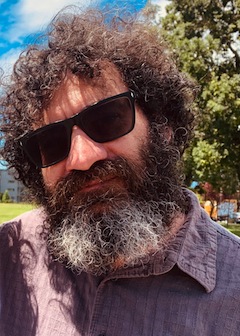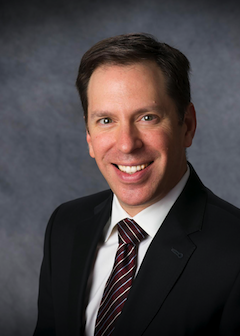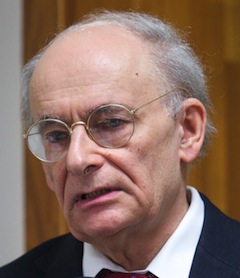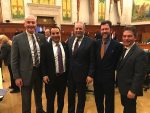A proposed fall semester course at the University of Victoria has raised concerns that it will become what B’nai Brith Canada described as “a forum for antisemitism.” The concerns were sparked by inflammatory comments the course’s instructor, Dr. Shamma Boyarin, wrote on social media earlier in the year.
In a May 26 Twitter post, for example, Boyarin used an obscene verb before labeling Abraham Foxman, former president of the Anti-Defamation League, a “Zionist pig.” On June 3, he ridiculed an individual who had been the recipient of a torrent of antisemitic abuse online. This was followed the next day by a post in which Boyarin remarked, “[It’s] hard for North American Jews to admit the truth: What is happening in Israel is ethnic cleansing and slow genocide.”
An online description of the UVic course, entitled Introduction to Antisemitism, has been modified since it was first posted. At an earlier stage, the description began, “What is antisemitism? As soon as one attempts definitions, it becomes clear that even the most fundamental aspects of antisemitism are controversial.” The course’s current title is also different from the original, which was Towards an Understanding of Antisemitism. Gone, too, is a study of present-day antisemitism.

The changes occurred in early August after B’nai Brith, among others, raised objections to UVic about Boyarin teaching a class on modern antisemitism. The course’s subtitle on the UVic website now reads, “A Historical Survey of Key Texts and Moments from Augustine to Luther.” Its description: “What is antisemitism? The term itself was coined in the late 19th century, but when does the phenomenon begin? Is it the same or different from ‘anti-Judaism’? Should we spell it ‘anti-Semitism’ or ‘antisemitism’? Beginning with these basic questions, we will focus on the particular role Christianity has played in developing and sustaining antisemitism in Europe.”
“Moving this course away from modern antisemitism is an important first step,” said Michael Mostyn, chief executive officer of B’nai Brith Canada. “However, we are still concerned that, instead of educating students on the scourge of Jew-hatred, there is a risk, albeit a reduced one, that hostility toward Jews will instead be promoted.
“UVic must provide assurances to the Jewish community that academic freedom will not be used as cover to falsely accuse Jews, as a whole, of contributing to genocide, among other antisemitic canards,” he added.
When contacted by the Independent, UVic expressed the position that it “does not condone antisemitism” and “that it is highly committed to equity, diversity and inclusion and to social justice in its many forms.”
“We are aware that a faculty member has expressed personal views in public communications which are disturbing to people. Those views are personal. They have not been made on behalf of the university or in the context of their work,” said Karen Johnston, a spokesperson for the university.
“Canadians have a constitutional right to free speech, subject to limits under the law,” she said. “And so it cannot be the role of the university to judge or censor its employees’ exercise of free speech in their private lives. While all faculty enjoy the privilege of academic freedom, there are also limitations to this right. In this specific instance, there is no evidence at this time that the faculty member has or will exceed those limitations in teaching this course.”
The university also said it “will act on any allegation that there has been a violation of university policies against discrimination or harassment, which apply to all members of our community.”
Rob Philipp, executive director at Hillel BC, has been monitoring the situation and has spoken with Dr. Kevin Hall, the president of UVic. Philipp said, “If the course does run, we will check to see what the reading material is and what is being taught.” However, he added, while the organization is keeping on top of things, there is not much that can be done to stop the course from going ahead.
Jeff Kushner, president of the Jewish Federation of Victoria and Vancouver Island (JFVVI), said they, too, will be following the UVic course and will remain in contact with senior administration staff.
“The JFVVI does not have any serious concerns about the course material, such as we know it,” said Kushner. “Our concerns are more about the academic and emotional safety of the students enrolled in the course. In this particular case, a professor at UVic made some very objectionable comments on his private Twitter feed. We wish that he had not made such incorrect and inflammatory statements, both in his role as an academic and as a Jew.
“He has not made these comments in any official capacity, and the university has been very clear that these objectionable views are not the views of the university. Our concern is that an individual having these views, and expressing them as he has, may find it difficult to leave them at the classroom door and, through explicit statements or implicit actions, may create an unsafe learning environment for Jewish students holding views contrary to his own.”
In a letter to the university, B’nai Brith urged UVic to publish the syllabus of the revised course online, to cancel the course if it is used to attack the Jewish community in any way and to follow other universities, such as Oxford and Cambridge, in adopting the International Holocaust Remembrance Alliance Working Definition of Antisemitism to “avoid future confusion.”
Boyarin has taught at the University of Victoria since 2008 in religious studies and medieval studies, and in the English department since 2009. According to his profile at UVic, his current research and teaching interests include medieval literature (particularly the literature of Spain and the Near East), comparative literature (particularly Hebrew and Arabic), literature and religion, Jewish studies, and the religious roots of antisemitism. He has additional expertise, his profile continues, in the connections between medieval and contemporary culture, especially as they manifest in heavy metal music and white supremacist ideologies.
The Independent tried to reach Boyarin for comment, but had not heard back from him at the time of publication.
Sam Margolis has written for the Globe and Mail, the National Post, UPI and MSNBC.



